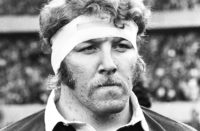 For those who survived the World Cup and everything else the fates threw at them, the longest of all seasons ended yesterday more than ten months after it began.
For those who survived the World Cup and everything else the fates threw at them, the longest of all seasons ended yesterday more than ten months after it began.
Dan Biggar finished up in Dunedin, 43 weeks after he set out in Cardiff last summer. For the English trio of Mike Brown, Dan Cole and Chris Robshaw, Sydney marked the end of a longer road, one which had taken them 44 weeks to negotiate.
James Haskell had been putting his body on the line since England's first pre-World Cup match against France at Twickenham in mid-August, a total of 45 weeks. Two other back-row forwards, James Heaslip and Taulupe Faletau, had been going longer still.
Each began as opposite numbers when Ireland beat Wales in Cardiff on August 8, making theirs a 46-week season. Going the distance from one summer to the next meant enduring the whole shooting match – World Cup, Six Nations, domestic League, Europe's knock-out tournament and a three-Test series south of the equator.
Heaslip's marathon ended in Port Elizabeth, Faletau's in Dunedin. Given that the World Cup conditioning programmes began early last July, they and their English counterparts have been training or playing for a whole year, give or take a week or two.
Those who refuse to empathise with the crunching physicality of their trade will make their position clear with a shrug of the shoulders, as if to say: “So what? They get paid very well for doing something we'd do for nothing.”
Inevitably, an increasing number are forced to retire before their time. Only this past week another joined their ranks, Wasps' 95-Test Italy centre Andrea Masi who, at 35, lasted longer than most but had no intention of giving up until an Achilles tendon blow at the start of the World Cup left him no alternative.
Every Union under the sun has been spouting forth, ad nauseum, about how they go out of their way to look after their players. World Rugby says it on their behalf: “Player Welfare. Putting Players First. No.1 Priority.”
And so it should be. How, you may well ask, can they make such a proclamation with one hand and then, with the other, give their approval to the same players being subjected to an exhausting schedule?
Cole's season ran to 36 appearances with 30 starts, Farrell's to 35 (29 starts). Biggar and Brown played 33 matches with 31 starts apiece, Robshaw and Heaslip 31, Haskell 30, Faletau 29. Is that World Rugby's idea of “putting players first?”
A simple way of putting players first would have been to cancel the end-of-season Tests, a not unreasonable way of easing the burden imposed by a World Cup season.
Had they been really serious, World Rugby would have over-ruled the commercial considerations in the interests of protecting their players from an unduly heavy load. Sadly, it was never going to happen.
Since the advent of professionalism more than 20 years ago, the game's governing body has singularly failed to put a limit on the amount of Test rugby. Successive chairmen from the late Vernon Pugh in the mid-Nineties have talked about it, a collective inertia which has allowed the international game to become over-exposed on an ever rising scale.
Wales, for example, played 17 matches during a 46-week season that started ludicrously early because of the World Cup and finished late, even more ludicrously so. It took Gareth Edwards three years to play 17 Tests, from April 1967 until March 1970 and he, of course, never missed a match.
Player welfare is all very well but not if it means reducing the amount of Test rugby to give the stars a break for their own well-being. As per usual, an alarming number had been reduced to various states of disrepair before the domestic season finished.
Wales left for New Zealand without a pair of back row Test Lions in Justin Tipuric and Danny Lydiate. Not surprisingly, four more players had to be invalided out of the tour, one after the first Test (George North), three more after the second (Gethin Jenkins, Bradley Davies and Josh Turnbull).
Ireland took off for South Africa without 12 crocks, six of whom were Test Lions, including Tommy Bowe, Rob Kearney, Sean O'Brien, Cian Healy and Johnny Sexton. The latter would have reason for thinking whether player welfare is all it's been cracked up to be.
During the Six Nations, World Rugby proved infinitely more pro-active with what an English prop said to a Welsh one at Twickenham than what a French player did to Sexton in Paris a few weeks earlier. They threw the book at Joe Marler but hardly bothered to open it in respect of Yoann Maestri's off-the-ball assault of Sexton.
It proved yet again that those who run the sport are never slow to talk a good game about player-welfare but when push comes to shove, as it did in all its crudity at the Stade de France in February, the referee, Jaco Peyper, didn't so much as utter a peep of admonishment.
Until the governing body rouses itself to impose a limit on the number of Tests any country can play in any 12 months – 14 sounds reasonable – then all their talk about player-welfare will feel like so much hot air. As Italy's new coach Conor O'Shea says: “Something has to give or the players will.”
Wayne Smith, then head coach of Northampton, sounded the same warning in 2002 – 14 years ago.
Since then two graphs show a constantly steep climb – one reflecting the amount of Test rugby, the other tracking the number of capped players battered into submission.
As a distinguished English prop used to say: “We're just lumps of meat. When you're knackered, they go out and buy another lump of meat.''
Why worry about the players when there is money to be made from playing more and more international matches?
When will they ever learn that less is more?


























